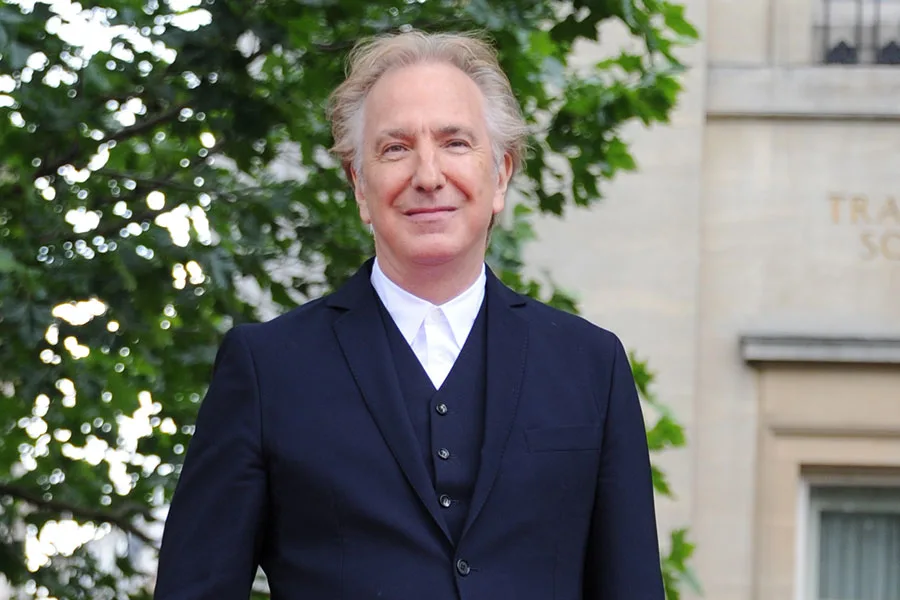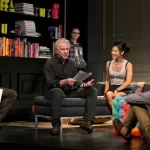Alan Rickman – A working-class hero at the court of Versailles
Hilary A WhiteMon 13 Apr 2015
Alan Rickman came from humble beginnings to become a big-screen icon. He talks about de Valera, Louis XIV and the legacy of Harry Potter
Your heart flinches ever so slightly when Alan Rickman smiles at you. That smile. That same macabre, fangy, slit-eyed grin that fooled John McClane and terrorised the townsfolk of Nottingham.
It appears often on the star’s face as he sits opposite me, his back to the blustery bright morning going on outside the window of the Merrion hotel. The 69-year-old is in town for a special screening of period romance A Little Chaos at the Jameson Dublin International Film Festival, and all is well with the world as he tells me about his Irish heritage through his paternal grandmother. “When I came here, and I’m not kidding,” he says with mock indignation, “it was absolutely like coming somewhere I knew, and that was back in the mid-nineties when I was shooting An Awfully Big Adventure. And those were the days before the banks went belly-up. Then it was unbelievably celebratory, and for me to just go into a bar and there wasn’t some dreadful jukebox but actually people talking and seeing Sharon Shannon play in a club, it was honestly like meeting a bit of myself. And I was talking to (Texas singer and friend) Sharleen Spiteri about being a Celt, how you smell each other out, because my mother’s family is Welsh. There’s not a lot of English blood in me.”
All of this is delivered via the great Rickman trademark, to use a horrible office-speak-ism, his “USP”; that voice.
To hear that rich, caramelised purr slowly enunciate something as mundane as ordering a coffee or commenting on the weather is remarkable. It is a voice designed to silence rooms, filmsets, political rallies and the mess hall of a school for wizards. It feels a crime to interrupt it but I must. Did it mean a lot to him to do a film like Michael Collins, given this family link?
He nods thoughtfully. “A huge amount,” he blinks. “Especially when you do the homework. I couldn’t see how Neil (Jordan, director) was going to do it in two hours. I thought that was an incredible achievement given that it ought to have been a 16-hour miniseries really. I could see a way that you could do that story from different points of view and then find a meeting point at the end.”
Rickman has spoken about playing real life historical characters and becoming “defensive” of them as human beings for the simple reason that if you judge your character too much they become harder to play. He felt this about King Louis XIV, who he plays in A Little Chaos, and still does about Eamon de Valera nearly two decades since the release of Michael Collins.
“It’s no secret what Neil’s feeling about de Valera would be,” he sighs with a hint of resignation. “I think there’s another movie to be made about one of the great love affairs of all time which would be de Valera and Collins before they split up. When de Valera was in America, Collins was going over and reading bedtime stories to his kids! They were such yin and yang, of course they were close on some level. I don’t subscribe to the view that de Valera was responsible for his death because as far as I can see he didn’t have enough power at that point, and there’s enough stories saying the day before he [Collins] was killed he was running around trying to find Collins. He must have known something but didn’t have the power to stop it. Yeah, it was very important to me at the time.”
This is obvious. You can hear it in the way he recounts sitting in a cell in Kilmainham Gaol and being handed a note written by de Valera in “the tiniest handwriting” asking the nuns to look after his family. “Incredible,” I remark, for a few reasons. “Yeah,” Rickman murmurs. “Rich, rich, rich.”
A Little Chaos is, after 1997’s The Winter Guest, the second time Rickman has directed a feature film, but the first where he has starred as well. Written by Alison Deegan (the Dublin-born wife of author Sebastian Barry), it tells of a landscape gardener and mourning mother (played by Kate Winslet) employed to design one of the lavish palace gardens at Versailles. It is a lush and canny outing that is quite understated for its genre. Studio investors, he says, insisted Rickman take a leading role as well as direct.
“It wasn’t my choice,” he explains. “The only thing that made it do-able was that Louis XIV was a bit like a film director. It’s a certain attitude of watching everything and making a choice or moving something. The expression on the face didn’t have to change much, and he’s a fixed point so he didn’t have to move anywhere. People come to him. I remember thinking, ‘if only somebody had invented the movies for Louis. Move over Harvey Weinstein.'” Another grin and another tiny flinch.
He politely entertains my assumption that there must be an element of stepping back in time when making such a sumptuous, costume-heavy production before squashing it. “You’re really living in the present,” he gently smiles. “Believe me, there’s always a gun to your head, a very present-day gun, and if it’s not the weather, it’s the money or just the pressures of film-making. The homework is enjoyable because you’re surrounded by people who are passionate. And if the weather’s kind and you don’t have an airplane flying through every 10 seconds, then there are great celebratory days of work. It’s just work. And that’s what’s enjoyable. You’re just working.
“Work”. It is that code Rickman has obeyed throughout a glittering stage and screen career that began when the then-26-year-old successful graphic designer won a scholarship to London’s Royal Academy of Dramatic Art (Rada) after giving in to the acting itch. Rickman grew up in a council estate in Hammersmith and his factory worker father died when he was eight. Life for his mother and three siblings wasn’t easy back then. Anything he achieved, he did so through graft, and acting, like any other profession, was a challenge, not a laugh.
“If you have a talent, all you have is a responsibility to it,” he insists. “You can’t take credit for it. It’s an accident of something or other. Somebody else is a brilliant firefighter. And it gets harder and harder; young actors today; they don’t have to be a member of the union and there’s no particular pressure on them to train. They don’t notice how quickly they could get spat out by the machinery and the finger snap and the box-ticking of it all.”
As Vice Chair at Rada, Rickman is well placed to be concerned about the lot of young actors, yet he does not fret over Daniel Radcliffe, Emma Watson and Rupert Grint, his former Harry Potter co-stars and arguably the most famous teens in the world during the planet-eating franchise’s heyday.
He and life partner Rima Horton – they met when they were both teenagers, and Rima went on to become a Labour Party councillor and an economics lecturer at Kingston University – never had children, but he speaks with pride about the trio. “All of them are brave young souls. You’ve only got to watch Emma speaking at the UN or Rupert throwing himself on to the West End stage or Daniel making really bold choices with his life and work. I don’t know if it’s down to luck or the fact that there were lots of voices to mentor them. I suppose we all talked to them when we had half a second on set.”
He still struggles to get over the Potter phenomenon, and marvels at meeting “obsessed” fans who weren’t born when he began playing shifty Severus Snape. “What is it about ‘once upon a time’,” he wonders aloud, “that still has such power over people’s imaginations? I find it a relief to think a child will pick up an actual book and get lost inside it. There’s something just fundamental about it; it’s how we figure out who we are by telling stories to each other.”
A good-natured Alan Rickman “harrumph” comes when I ask about retirement. “You try saying that word to Judi Dench or anybody,” he scolds. “The point about actors is the work goes on.”



